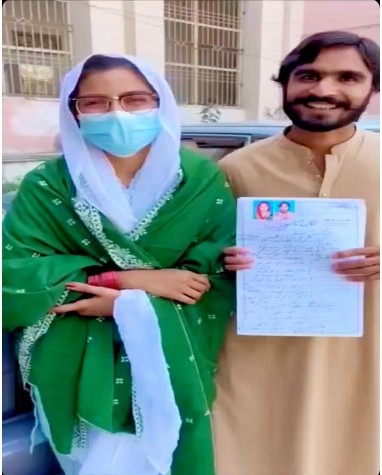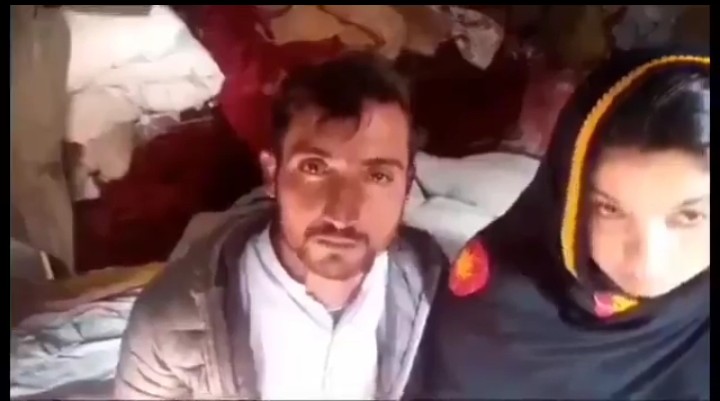Location: Hyderabad, Sindh, Pakistan
Date of Incident: Wednesday, 30 April 2025
In yet another deeply disturbing incident highlighting the plight of religious minorities in Pakistan, a 14-year-old Hindu girl named Teji Thakor was abducted from her home in the village of Paban, near Hyderabad, Sindh, on the night of May 1, 2025. According to her parents, members of the Tangri Muslim community forcibly entered their house during the night, physically assaulted the family, and abducted the minor.
Following the abduction, Teji was reportedly converted to Islam and married to a Muslim man named Basheer Ahmed. In addition to the abduction, the attackers vandalized the Thakor family’s home and issued grave threats. They warned the family that if they dared to raise their voices or seek help, their other daughters would also be kidnapped.
A Climate of Fear and Systematic Harassment
This incident is not an isolated case. Reports from the region indicate that the Tangri Muslim community has been involved in a campaign of harassment against the local Hindu population. Multiple Hindu homes have been attacked and vandalized, and Hindu temples have been desecrated. These violent acts have created an environment of fear and panic, prompting many Hindu families to flee the area in search of safety.
Despite the presence of protective legislation like the Sindh Child Marriage Restraint Act, which explicitly prohibits child marriage, local authorities have reportedly refused to take action. No First Information Report (FIR) has been registered, and police have shown a shocking lack of intervention.
A Broader Pattern of Persecution
This case represents a broader and well-documented pattern of systemic discrimination and religiously motivated violence faced by the Hindu minority in Pakistan. Common manifestations include:
-
Abduction and Forced Conversions: Young Hindu girls are frequently abducted, forcibly converted to Islam, and married off without consent.
-
Temple Attacks: Hindu places of worship are often vandalized or destroyed as acts of religious hatred.
-
Blasphemy Accusations: Pakistan’s blasphemy laws are disproportionately used against Hindus, resulting in wrongful imprisonment and societal harassment.
-
Social and Economic Marginalisation: Hindu communities suffer from restricted access to education, employment, and justice.
-
Forced Migration: Violence and fear are often used to drive Hindus out of their homes, effectively cleansing areas of non-Muslim residents.
Why This Is a Hate Crime
This case has been documented under multiple categories of religiously motivated hate crimes, with specific attention to the following:
1. Predatory Proselytisation (Conversion of Minor)
Teji’s abduction, forced religious conversion, and marriage are textbook examples of predatory proselytisation. The process of grooming minors—who lack the capacity for informed consent—is a manipulative form of religious indoctrination. It often involves coercion, subtle psychological manipulation, and exploitation of trust.
Such conversions are not acts of free will but rather instruments of religious supremacy, where a minor’s vulnerability is weaponized against their community and faith.
2. Attacks Based on Hindu Identity
This incident also qualifies as a hate crime under the category of religious identity-based violence. The attack on Teji and the threats made to her family were not motivated by personal grievances but by their Hindu identity. The use of violence, threats, and religious conversion to target individuals based solely on their faith is a clear violation of human rights and religious freedom.
3. Induced Migration Through Violence
The broader context reveals a chilling intent: to forcibly displace Hindu families from Muslim-majority areas. This has been done by creating a climate of terror—attacking homes, desecrating temples, and threatening women. Even when not explicitly stated, the goal is clear: to turn diverse neighborhoods into religiously homogeneous ghettos by driving out minority communities.
4. Attacks on Temples and Hindu Religious Symbols
In Hindu belief, temples are not just places of worship; they are sacred dwellings of divine energy. Attacking temples is not a random act of vandalism—it is a direct assault on Hindu Dharma and an act of religious hatred. The repeated desecration of temples in this region underlines the broader objective: the suppression of Hindu faith and visibility.
A Systemic Failure of Justice
Despite clear evidence and repeated patterns of abuse, Pakistani authorities have largely failed to protect religious minorities. In Teji’s case, even the legal system, including child protection laws, has failed her. The refusal to register an FIR or pursue the perpetrators reflects a larger institutional bias and unwillingness to challenge religious extremism.
Reports from numerous human rights organizations show that such crimes are often aided, ignored, or passively enabled by local law enforcement and judicial systems. Victims and their families are left with no legal recourse, forcing them into silence or exile.
Conclusion
The abduction and forced conversion of 14-year-old Teji Thakor is not just a tragedy for one family—it is a stark reminder of the systemic persecution faced by Hindus in Pakistan. It exposes the deep-rooted intolerance and religious bigotry that minorities endure in many parts of the country.
This incident must serve as a wake-up call for international human rights organizations, legal institutions, and civil society to demand accountability and justice. No child should be taken from their family, stripped of their identity, and forced into religious conversion. And no community should be forced to live in fear because of their faith.
Until there is consistent pressure for reform, protection, and enforcement of minority rights, these tragic incidents will continue to haunt Pakistan’s Hindu community.
Call to Action:
Raise your voice. Share this story. Demand accountability. Support organizations working to protect religious minorities and human rights in South Asia.
For more updates and detailed coverage of this case and other issues affecting the Hindu and Sindhi communities in Sindh, Pakistan, stay tuned to Sindh Renaissance.






